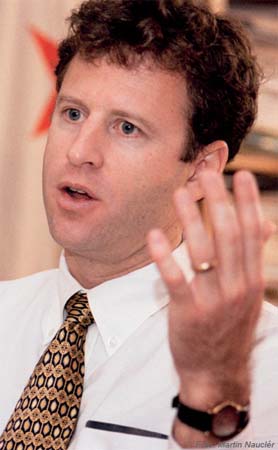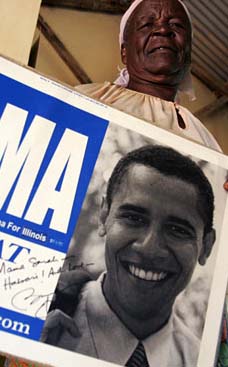
"Helping the Afghanistan government recruit, vet, train and equip a total of 300,000 to 400,000 security forces will take time as well as money. Only some 40% of necessary American and NATO trainers are in place even for the current scale of effort. We have about 2,000 trainers in Afghanistan (compared with nearly 6,000 in Iraq), and NATO allies have just another 500. Doubling this scale of effort will take a new infusion of resources, including perhaps the transformation of some American combat brigades into what retired Army Colonel John Nagl describes as an Army adviser corps." Michael O'Hanlon, a Senior Fellow at the Brookings Institute and a Visiting Lecturer at Princeton University, served as a Peace Corps Volunteer in Congo Kinshasa.
Michael O'Hanlon writes: How to Win in Afghanistan
How to Win in Afghanistan
A minisurge is not enough. We need more Afghan security forces.
By MICHAEL O'HANLON
The war in Afghanistan is not going well, and the critical problem is the same one that dogged our efforts in Iraq for years: grossly inadequate troop levels. Western troop totals there have just inched over 60,000, while Afghan security forces total some 140,000. Let's put this into perspective: We are trying to do with 200,000 personnel what it took 700,000 soldiers and police (plus 100,000 "volunteers") to accomplish in Iraq. But Afghanistan is even larger than Iraq, and more populous.
President-elect Barack Obama has wisely promised an increase in U.S. forces for Afghanistan. But his proposed minisurge of perhaps 15,000 more troops, on top of the 30,000 Americans and 30,000 NATO personnel now there, will not suffice as a strategy. More is needed.
To be sure, it is not all about numbers. As Gen. David Petraeus has already underscored, Afghanistan is not Iraq, and what worked in one place may not succeed in another. Among other things, the Pakistan sanctuary enjoyed by Taliban fighters, as well as partisans supporting Jalaluddin Haqqani and Gulbuddin Hekmatyar and other warlords, complicates the Afghan situation enormously. That said, basic principles of counterinsurgency and stabilization do have a general applicability across missions. The size of security forces always matters.
Secretary of Defense Robert Gates finally reached a decision late this summer to help the Afghans double the size of their Army, a policy that will bring their own total security forces to 200,000. Coupled with the two to three additional brigades of American GIs expected to go to Afghanistan in the coming months, we will collectively reach some 275,000 total coalition troops -- an improvement, but still less than half of what has been needed in the smaller country of Iraq.
The core reason that aggregate security forces in Afghanistan are so small is because of a conscious decision by Western states to keep them that way. Afghan politics have been part of it, but much of the rationale has been due to Afghanistan's purported inability to fund a large force. For that reason, the army has grown astoundingly slowly -- numbering just 6,000 soldiers in 2003, increasing to about 25,000 through 2005, and then going up to 36,000 in 2006, 50,000 in 2007, and 58,000 in 2008. Police and border-security forces have followed a similar trajectory. As Jason Campbell and Jeremy Shapiro show in the Brookings Institution's new Afghanistan Index, only 30% of army forces and just 3% of existing police forces rank in the top two tiers of combat readiness.
Afghanistan's GDP is only $11 billion and its annual federal budget is just $4 billion (more than half from foreign aid). It clearly cannot sustain a large army and police. So why build a large Afghan security force?
The answer is simple: because the alternatives are worse. One possibility is to increase the number of NATO forces deployed in Afghanistan, pushing the combined cost of the operation well above the current $4 billion a month. The other possibility is most likely to lose the war.
The United States has been spending nearly $3 billion a year to fund the Afghanistan security forces of late. This is a great deal of money but far less than our own military costs in that country. We should be willing to double that $3 billion a year if need be. The added expenses need not stay high indefinitely. Once Afghanistan's security forces have their needed equipment, and provided President Obama can cajole and pressure other major countries to foot their share of the bill, American security aid requirements should drop back to current levels.
Writing in the current issue of Foreign Affairs, two notable South Asia scholars asked whether the American political system was reliable enough to commit such funds to an enlarged Afghan security force over an extended period. The answer is yes. We have proven as much over the years in funding Korea and Taiwan, Greece and Turkey, and for the last three decades Egypt and Israel, when our core security interests dictated it. Certainly Afghanistan, where al Qaeda once had its main home -- and where over 20 American GIs as well as another 10 foreign troops a month have been losing their lives, carrying out a mission that Afghans themselves are not yet ready to lead -- is worth a comparable financial investment.
Helping the Afghanistan government recruit, vet, train and equip a total of 300,000 to 400,000 security forces will take time as well as money. Only some 40% of necessary American and NATO trainers are in place even for the current scale of effort. We have about 2,000 trainers in Afghanistan (compared with nearly 6,000 in Iraq), and NATO allies have just another 500. Doubling this scale of effort will take a new infusion of resources, including perhaps the transformation of some American combat brigades into what retired Army Colonel John Nagl describes as an Army adviser corps.
Thankfully, in a broader strategic sense we can be patient. While the human toll of the Afghanistan war is tragic, it remains far less bloody than was Iraq at its peak levels of violence. And the Afghan people, while less impressed with their own government and with the United States than before, remain hopeful and resilient according to public-opinion polls. But while we may have some time, we do not have time to waste. Working with President Hamid Karzai, the new American administration must make rightsizing the Afghan security forces among its very top priorities.
Mr. O'Hanlon is a senior fellow at the Brookings Institution.













